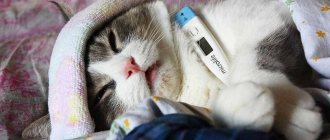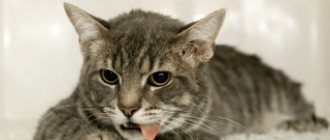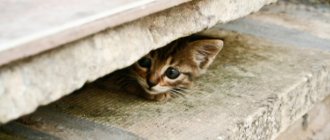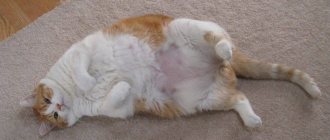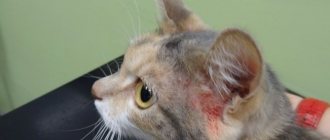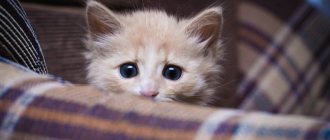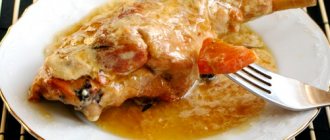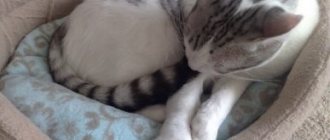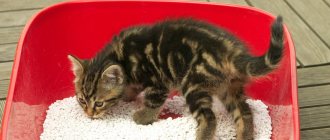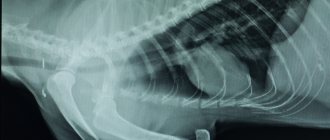Common Causes of Malnutrition
In most cases, malnutrition is associated with stress, age, or poor food quality. Sometimes kittens eat little due to health problems.
Bad feeling
Most often, a deterioration in appetite due to poor health is associated with factors such as:
- Vaccination period. After vaccinations, the body fights the introduced pathogen, which can lead to a lack of interest in food for 1-2 days.
- Infections. They can manifest themselves in the form of diarrhea, the presence of impurities in stool, cough, etc.
- Heat. In the summer, cats tend to eat less, as the body spends less energy on heating.
- Hormonal changes. Most often, a kitten begins to worry at 7-9 months during puberty.
- Diseases of internal organs. Dental pathologies, tumors, etc. can cause refusal to eat.
- Shedding. Long-haired cats and animals with thick fur coats are especially affected. Wool accumulates in the stomach and can cause vomiting or intestinal obstruction.
- Taking medications. Antibiotics often cause the condition to worsen.
- The period of estrus or sexual hunting. At this time, the reproductive instinct comes to the fore, so animals worry less about hunger.
- Intoxication. May be associated with the ingestion of chemicals into the body, internal diseases, poor-quality food, etc.
Sometimes cats are diagnosed with anorexia, but in most cases it is secondary and occurs as a consequence of another disease. Sometimes this condition can be observed in eating disorders.
In their natural environment, cats expend a lot of energy to catch small prey, so they always try to keep themselves full and eat a lot. Pets don't need to hunt, so they have poor portion control.
Anorexia can also be associated with negative experiences in the past. For example, if food for some reason previously caused vomiting, even after treatment the kitten will be malnourished. In such cases, it is sometimes advisable to temporarily feed the animal through a tube until appetite is restored.
Poor living conditions
Cats are conservative and sensitive, so any changes or discomfort can cause the animal to refuse to eat. This happens due to stress. It can be provoked, for example, by moving. Changing family composition also affects the pet's well-being. Young kittens often do not eat well when they arrive at a new home. This phenomenon is temporary: the situation improves after 3-5 days.
The animal may not eat well if the room is not clean enough. Most often, this is observed in pets who are kept in enclosures and cages. They are unable to leave the area and contaminants accumulate, causing stress.
Sometimes refusal of food is associated with the cruel behavior of the owner. For example, when the owner hits a kitten for missing the litter box. In such cases, the animal may eat less in order to go to the toilet less often. Added to this is the kitten's stress.
Little age
Month-old and younger kittens may have trouble eating due to constipation. In babies, the gastrointestinal tract is unstable, so they need massage to empty their bowels. Normally, the mother licks her kittens regularly to encourage muscle relaxation and the release of feces and urine. If for some reason the cat cannot take care of the cubs, the owner will have to monitor the digestion of the pets.
To get the kitten to go to the toilet, you need to wet a rough cloth with warm water and start stroking its belly. Then you should go down to the tail area. First, the animal will relieve a small need, then a large one.
Malnutrition may not be due to poor appetite, but to a lack of milk during the mother's lactation. In such cases, kittens continue to meow even after feeding. They gain weight by less than 5-7 g per day or lose weight altogether. If you weigh them before and after feeding, the difference will not be noticeable. To prevent malnutrition, you need to buy a special cat's milk substitute in the form of a mixture and supplement your pets with it.
If there is only one thin kitten, sleeps a lot and cannot get to the nipples because of its brothers and sisters, it needs help. You can supplement it with the mixture separately. An alternative option is to place it next to the most developed nipple. Other cubs need to be displaced at this time. If after this the kitten becomes active and begins to eat well, there is no reason to worry.
If an animal is separated from its mother early and sold to a buyer, food refusal may be caused by a lack of habit and insufficient development of the gastrointestinal tract. Kittens under 6 weeks of age are not ready to completely switch from milk to food.
If you abruptly offer them dry food, they will consider it inedible due to lack of experience. Switching too quickly to new types of food is fraught with problems with the gastrointestinal tract and the development of diseases in the future, so it is better to buy a kitten at least 8-10 weeks old.
Unpleasant odors
Bad odors from food, bowls, or poor indoor climate can trigger a deterioration in appetite. The latter is often associated with poor placement of trays. Cats prefer not to relieve themselves where they eat. Bad smell from the bowl in most cases occurs when feeding natural products.
When worn, the surface of the container is scratched, and food particles get into it, which become food for bacteria. The result is an odor. Another reason could be poor hygiene.
Often an unpleasant odor is caused by spoilage of food. Natural foods and wet foods can become unappealing to a kitten after just 30-40 minutes. Granules can remain fresh for a long time, but they are also susceptible to spoilage.
The average shelf life of dry food after opening the package is 6-8 weeks. Later, due to contact with air, it oxidizes, oils go rancid, and the smell and taste become repulsive. For this reason, it is not recommended to purchase food in bulk: bags can remain open in the store for a long time.
Occasionally you come across defective packages, the granules in which were initially spoiled due to leaky packaging. In such cases, it is recommended to try giving the cat the same food from a different bag. If the animal starts to eat, there is no reason to worry.
Possible causes based on the type of vomit
Lack of appetite in pets is common. Often
the health of cats is normalized and does not pose a threat. But there are situations when a minor deviation in a pet’s health develops into a serious pathology. There are several main causes of nausea.
Wool
In the process of washing themselves, cats constantly lick off fur from themselves, which accumulates in their stomach.
Such a lump is called a bezoar. This is a natural and harmless process. By periodically regurgitating hairballs, the pet gets rid of it on its own.
During periods of active molting, bezoars that are too large may form. This is especially true for fluffy long-haired breeds.
The animal cannot vomit such a lump on its own. The most dangerous consequences of this can be blockage of the digestive tract and intoxication of the body.
Poisoning and infections
In the process of washing, cats constantly lick off their fur, which accumulates in their stomach.
Many domestic cats go outside. There they can eat spoiled food or get an infection. Severe poisoning is accompanied by constant vomiting and diarrhea. There is a high probability of dehydration and death.
Infection is accompanied by fever and nausea. It is necessary to quickly determine the type of pathogen and begin treatment. In these cases, contacting a veterinarian is mandatory.
The problem is in the mouth
A common reason for refusing to eat can be oral disease. The most common may be stomatitis, gum disease, and changing teeth.
The cat behaves quite normally during the day; slight anxiety begins only when approaching a cup of food. Therefore, the owner may not notice the problem.
You need to examine the oral cavity and contact a specialist to prescribe treatment.
Be sure to read:
A cat has diarrhea and vomiting: what to do at home, reasons, what can be given, what to feed
Intestinal obstruction
The cause of poor health may be intestinal obstruction. It occurs as a result of a foreign body entering the digestive tract. These items could be bones, small toys, Christmas decorations, or overly large hairballs.
Obstruction can also occur due to the development of a hernia, tumor, or intestinal volvulus. Not only does your pet have a lack of interest in food and nausea, he also does not go to the toilet. The condition is very dangerous and without the necessary treatment is fatal.
Other serious causes of vomiting in cats and kittens
The cause of poor health may be intestinal obstruction.
There are other factors that cause vomiting attacks:
- Worms. After infection with parasites, pets' appetite increases. But pests multiply and occupy large spaces in the stomach and intestines. As a result, the cat begins to refuse to eat food and water, and nausea and diarrhea occur.
- Pathologies of the digestive organs. Cats may also suffer from liver, pancreas or stomach diseases. An accurate diagnosis in this case can only be made by a specialist.
- Pathologies of the urinary system. They develop due to poor quality feed. Males are more often affected. In addition to refusal to eat and vomiting, the animal experiences severe thirst, lack of urination or pain.
- Binge eating. Cats should eat small meals several times a day. Often the owner pours a large bowl of food at once. The stomach cannot cope with digesting large amounts of food and becomes empty.
- Rabies. The disease is often accompanied by refusal to eat and nausea. It can easily be confused with indigestion. But if there is a drooping jaw, excessive drooling and apathy, the pet should be immediately isolated.
How to fix the situation
If the animal does not show signs of disease, you need to calculate the cause and try to eliminate it. The approach in each case will depend on the conditions. For example, if there are frequent hormonal changes and sexual heat, it is recommended to castrate your pet. This will correct his behavior and relieve discomfort when instincts become aggravated.
When stressed, the conditions of keeping the animal are reviewed. He is given a personal territory where he can rest. Small kittens that are early weaned from their mother can be supplemented with a milk replacer, then gradually introduced complementary foods.
Need for veterinary intervention
If your kitten is not eating well but appears active and healthy, you can postpone a visit to the veterinarian and keep an eye on him. With pathological causes of malnutrition, pets become lethargic. An urgent visit to the doctor is required if the animal is diarrhea, frequently breathes from the stomach, experiences nausea after sleep, etc.
Correction is needed in cases where the animal’s ribs begin to stick out due to poor nutrition. This indicates exhaustion. The most dangerous situations are when the kitten completely refuses water. The exception is eating natural products: they contain a lot of liquid.
Reasons for kittens refusing food
Each organism is individual, and animals are no exception in this regard. There are a variety of reasons why a cat refuses to eat. Below are the most common ones. So:
- does not eat anything . For example, if he was just taken into the house, torn away from his mother. Naturally, in the first days the baby suffers, experiences stress, misses his mother and wants to return to his usual environment. By refusing food, he thus rebels and tries to show his protest. Similar situations happen with older children with tails, if they don’t like something (the atmosphere in the family, the owner’s attitude, etc.).
- It often happens that a kitten does not eat well or is on a complete hunger strike because he does not like or does not like the food . For example, if a very small animal (a month and a half old) is offered adult food, it is quite natural that he refuses it. Tiny pets that have just been weaned from a cat need, first of all, mother's milk.
- Sometimes a small kitten does not eat due to various ailments . These could be worms, dental or gum diseases, digestive problems, etc. In this case, the baby usually behaves restlessly - “cries”, sleeps poorly; vilifies or, conversely, stops walking around; looks unhappy and sick.
- If your baby approaches the bowl and then suddenly jumps away from it or scratches with its paw, it may be that she doesn’t like the smell . Cats are very sensitive in this regard. By the way, a dirty bowl can also be the reason that an animal refuses to eat or even drink milk.
© shutterstock
It is not always possible to determine the cause yourself. If we are talking about a very small pet, it is better to contact a veterinarian. He will help you understand the situation and tell you what to do and what to do.
Consequences of poor nutrition
In adult kittens older than 6-8 months, short-term refusal of food (up to 18-24 hours) does not cause any consequences and may be normal. Sometimes animals deliberately starve to relieve the burden on the gastrointestinal tract. However, in small kittens up to 2 months old, the clock is ticking. In cubs under 2 weeks of age, even after 4-6 hours of fasting, irreversible changes may begin.
Long-term malnutrition is fraught with gastrointestinal diseases, anemia, and kidney pathologies. Respiratory disorders, heart rhythm disturbances, growth retardation and even death of the animal are possible.
Feeding tips
If all possible causes have been excluded, and the examination failed to identify the disease, you can try changing the menu. Some cats are picky and prefer only certain types of food. However, you should not feed the animal only delicacies, otherwise it will become capricious and refuse normal food, and this will only worsen the problem.
If you give your pet dry food, change the brand. Avoid economy and premium diets: they contain flavoring additives, after which it becomes difficult to switch the kitten to other products.
To improve the aroma of food, you can use special seasonings for cats. They are added to natural products. If your pet eats dry food, you can try mixing it with a small amount of spider sauce: this will give it an appetizing smell.
If your kitten has free access to food, try limiting it. Under conditions of deficiency, appetite increases. You can deliberately reduce the portion to create an artificial shortage of food, then gradually increase the amount of food to the required amount. If the kitten begins to malnourish again, go back a step.
What to do if the kitten doesn't eat?
- Cats
Lack of appetite in pets makes their owners pretty nervous.
Small representatives of the animal world are of particular concern. Today we will talk about what to do for the owners of hungry little kittens who do not want to eat anything. First you need to determine the reason for the kitten’s lack of appetite. These include stress, change of environment, small age of the pet, unpleasant, repulsive smell of food and bowls, change of weather, as well as the presence of parasites and other diseases in the animal.
After discovering a problem with lack of appetite, here's what you need to do.
- Take your pet's temperature. The temperature of a healthy kitten should be 39-39.50C degrees. An excess of this indicator indicates an infectious disease, a decrease indicates a loss of vitality.
- If the temperature is normal, then feel your pet's belly. If he starts screaming loudly, it means you have found the source of the pain. If the kitten screams non-stop, then it may have a volvulus.
- Do not give your cat laxatives as this may cause digestive problems.
- Do not massage your pet if your actions are unpleasant to him.
- Be sure to show your pet to the veterinarian. Do not refuse to take x-rays and undergo the required tests.
- Don't let things go to the point of surgery. This measure should be a last resort. Try with all your efforts to improve the kitten’s digestion, support its body with IVs and the necessary injections.
Perhaps your little pet is not eating because you do not know the rules of feeding it. These include:
- Young kittens should be bottle-fed with cat milk replacer.
- Do not force feed your pet as this may frighten him.
- Replace dry food with wet food. Soak a pad of Whiskas or other food in plain water. If you prefer natural food, then put boiled lean meat or fish in a bowl.
- Make sure your kitten drinks. If the baby does not know how to lap, then feed him through a pacifier or pipette.
- Do not offer your pet heavy food, including broth.
- Try hand feeding your kitten. Place some food on your finger and offer it to your pet. If it fails, do not stuff food into it, try again after a while.
- Find out from the previous owners or the seller your pet’s usual diet.
If none of the above recommendations yield results, then immediately contact your veterinarian. He will help you find out the reason and tell you how to feed your pet.

